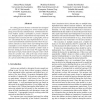Free Online Productivity Tools
i2Speak
i2Symbol
i2OCR
iTex2Img
iWeb2Print
iWeb2Shot
i2Type
iPdf2Split
iPdf2Merge
i2Bopomofo
i2Arabic
i2Style
i2Image
i2PDF
iLatex2Rtf
Sci2ools
94
Voted
DEXAW
2002
IEEE
2002
IEEE
Private Auctions with Multiple Rounds and Multiple Items
For selling spectrum licenses economists have designed new auction types proceeding over several rounds and offering several licenses simultaneously. Communication between bidders usually is forbidden to prevent collusions (i.e., through separate compartments and supervision). We investigate these auctions from the cryptographic point of view and identify that the usual implementation by a succession of (traditional) sealed-bid auctions where the auctioneer announces at least winner and winning bid of each round offers a covert channel to the bidders. The announcement should be limited to the minimum a bidder needs to know for taking part in the next round. We suggest that the bids made are kept private and she only gets to know which items she currently wins. Only at the end, overall winners and winning bids are revealed. We present a protocol based on a special sealed-bid auction that implements this idea.
Related Content
| Added | 14 Jul 2010 |
| Updated | 14 Jul 2010 |
| Type | Conference |
| Year | 2002 |
| Where | DEXAW |
| Authors | Ahmad-Reza Sadeghi, Matthias Schunter, Sandra Steinbrecher |
Comments (0)

